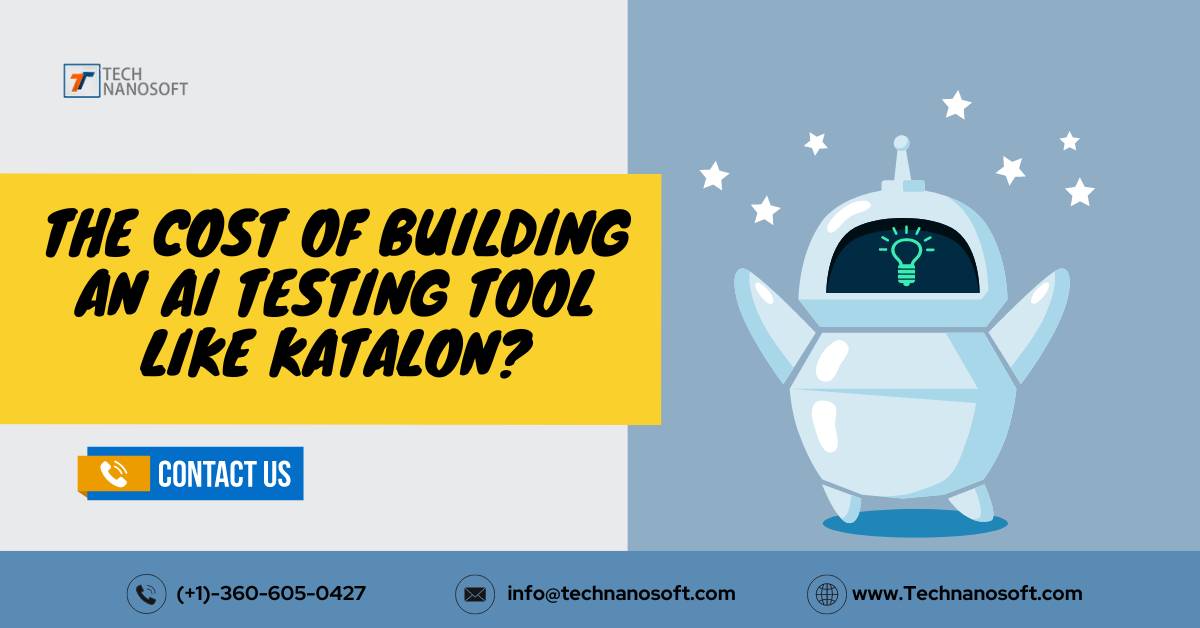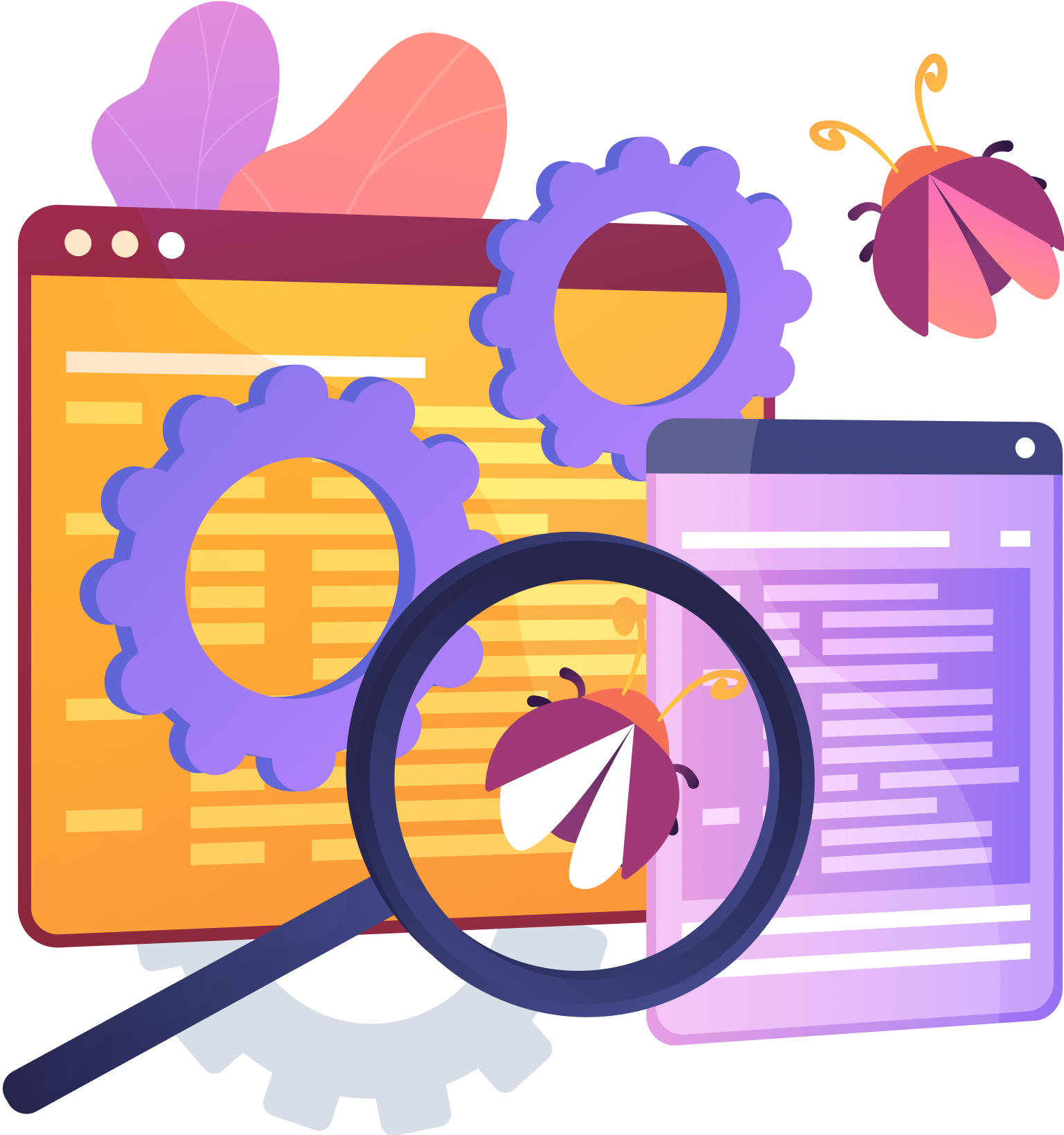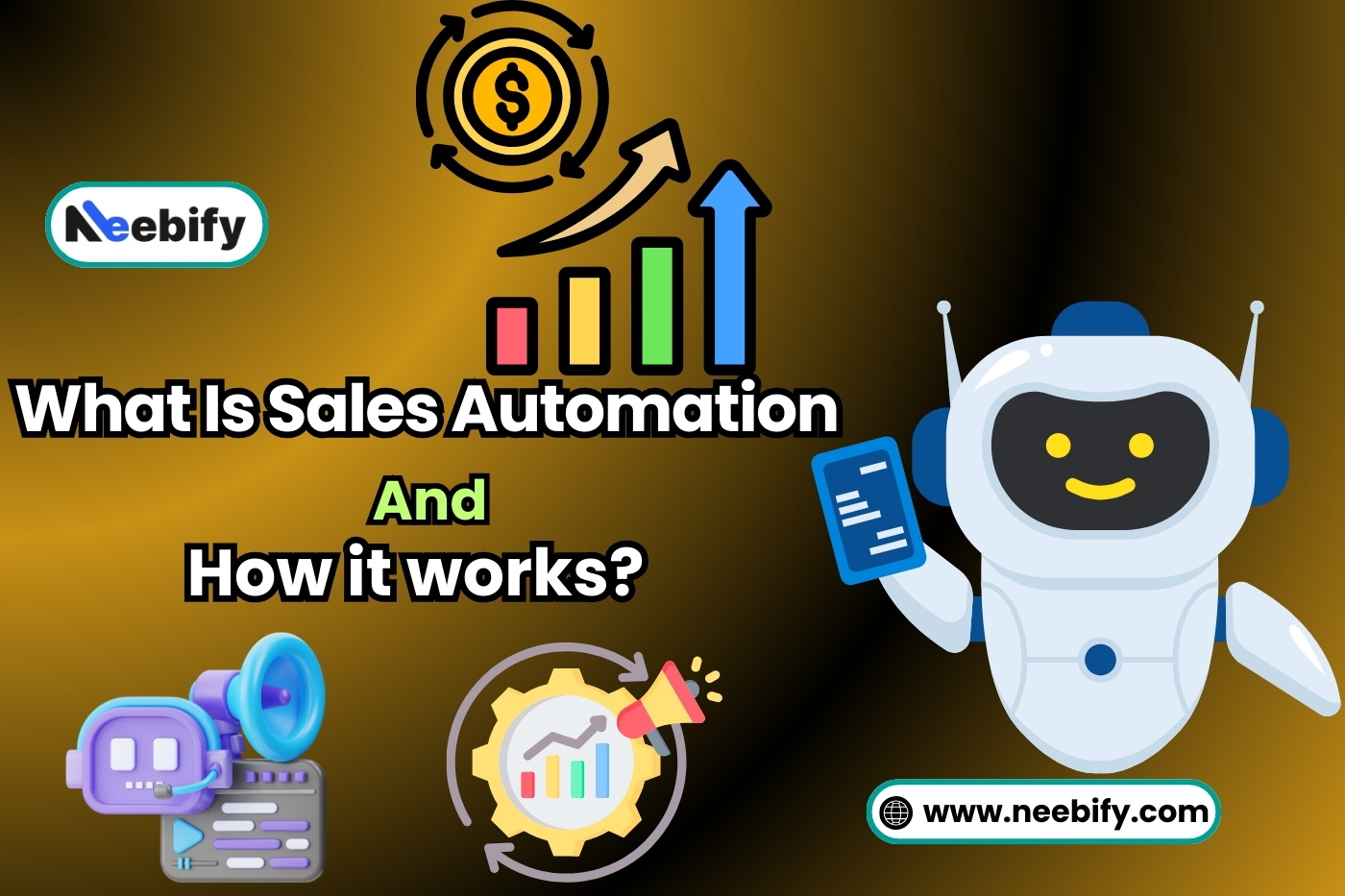The Cost of Building An AI Testing Tool Like Katalon?

Making sure apps are reliable and of high quality is crucial in the quickly changing world of software development. AI is changing how we test things, creating AI-driven solutions that make testing faster and more efficient. We explore the nuances of AI testing tools, their invention, functionality, and the many benefits they provide in this extensive reference to the field of AI testing.
AI Testing Tools
Software solutions that use artificial intelligence (AI) to improve and automate software testing procedures are known as AI testing tools. By utilizing AI-driven capabilities, these solutions automate a variety of testing operations, such as the creation, execution, analyzing, and reporting of test scripts. They make test scripts, automate tests in different environments, and analyze test results for errors using machine learning techniques.
To ensure comprehensive test coverage and scalability, AI testing systems often include dynamic object identification and performance testing features. These solutions use artificial intelligence (AI) to speed up testing cycles, increase test accuracy, and maximize resource usage all of which improve the dependability and quality of software systems.
Tools For AI Testing Similar To Katalon
Katalon Platform
This well-respected platform offers a wide range of functionality and a powerful toolkit for API, web, and mobile testing. Thanks to AI capabilities, it excels in automating the creation of test scripts and speeding up testing procedures without sacrificing accuracy. Because of its adaptability, testers looking for complete solutions in a variety of testing contexts frequently choose it.
TestCraft
TestCraft is unique in that it is a cloud-based automation platform that uses AI to automate codeless tests. Thanks to its user-friendly interface and AI-driven features, it enables users to write and run tests without any coding knowledge. TestCraft optimizes testing procedures, guaranteeing effective test implementation and improving test coverage and dependability in a variety of project contexts.
Applitools
Applitools is a visual testing specialist that uses AI-powered visual AI technology to assess visual content and user interfaces on a variety of platforms and devices. Applitools' AI powers guarantee pixel-perfect UI rendering and adaptive object detection, enabling accurate visual testing results and improving software quality with unmatched precision.
Testim Automate
This software uses artificial intelligence (AI) to streamline the procedures involved in creating, running, and maintaining tests. Its AI-driven methodology reduces manual intervention while improving test coverage and reliability. Testim Automate is a top option for businesses looking to accomplish quick software delivery with excellent quality control since it simplifies testing procedures, guarantees effective execution, and produces accurate results.
Important Components of AI Testing Tools
Test Script Generation
By automating the writing of test scripts, AI-driven solutions simplify the testing process. This ensures a more effective use of resources by lowering manual labor and shortening testing schedules. These solutions improve overall testing speed and effectiveness by utilizing AI algorithms to analyze requirements and develop precise test scripts tailored to specific features.
Automated Test Case Execution
AI-driven testing solutions ensure quick and reliable software feature validation by automating test case execution. These technologies lower the possibility of human error while increasing efficiency and dependability by doing away with manual intervention. ai tester Continuous testing is made possible by automated test execution, which speeds up software delivery cycles and feedback loops.
AI-Powered Test Analysis
In order to better understand test results, patterns, and insights that can be used to improve testing techniques, AI algorithms are essential. AI-powered test analysis analyzes enormous volumes of data to produce useful suggestions for enhancing software quality and streamlining testing activities. As a result, businesses may improve their testing procedures on a constant basis and make data-driven decisions.
Dynamic Object Identification
AI gives testing tools the ability to identify dynamic objects, which guarantees reliable test automation for UI frameworks and technologies that are always changing. Artificial intelligence-driven tools improve test coverage and reliability in dynamic application settings by adjusting to changes in UI elements and configurations. This allows the tools to accurately detect and interact with dynamic items.
Performance Testing
By analyzing system performance in a variety of scenarios, AI-driven performance testing finds bottlenecks and improves application performance. AI-powered performance testing ensures the scalability and stability of apps by replicating real-world scenarios and load conditions. This improves user experience and minimizes performance-related concerns in production environments.
Reporting and Analytics
AI testing platforms have extensive reporting and analytics features that let stakeholders monitor the status of testing, spot problems, and come to well-informed conclusions. These platforms provide useful insights into testing results by gathering and evaluating test data. This helps stakeholders focus their efforts, deal with pressing problems, and enhance the overall quality of their program.
Collaboration and Version Control
By offering centralized repositories and version control systems, AI testing platforms make it easier for team members to work together seamlessly. This guarantees that team members can monitor changes, share resources, and work together productively, increasing testing process productivity and efficiency. AI testing solutions guarantee correctness and consistency in test artifacts across teams and projects by offering version control.
Security Testing
Applications are strengthened against possible threats and vulnerabilities are found via AI-powered security testing. Security testing tools assess the resilience of security measures by simulating attacks, analyzing application behavior, and locating security flaws through the use of AI algorithms. This protects apps from cyber security risks and guarantees the integrity and confidentiality of important data.
Scalability and Flexibility
AI testing solutions are flexible and scalable, adapting to changing project demands and various testing specifications. These tools ensure cost-effectiveness and optimal resource use by scaling up or down in response to workload needs. Businesses are given the ability to customize, integrate, and deploy in various ways. This allows them to adapt to changing needs and technology.
Cost of Creating a Testing Tool Like Katalon
The price of developing a testing tool similar to Katalon depends on a number of variables. First off, the total cost is greatly impacted by the breadth and complexity of the tool's features. The complexity of implementing advanced features, such AI-driven capabilities, drives up development costs. Expenses are also influenced by the development resources and technology stack that are selected; more expensive solutions are associated with highly qualified developers and specialized technologies.
We allocate a large amount of the budget to infrastructure costs, which include hosting services and servers. Furthermore, a significant financial commitment to research, development, and license costs is needed for AI integration. To ensure the technology's long-term sustainability and reliability, recurring expenses such as testing, maintenance, and support are essential.
Development of An AI Testing Tool Like Katalon
Identify the Needs and Goals
Establish the goals, features, and target market for the testing tool, making sure that they are in line with user needs and market demands. Developers can concentrate their efforts on creating a solution that successfully tackles particular testing difficulties and benefits the target consumers by clearly defining these elements.
Choose a stack of technologies
Select a stack of technologies that includes programming languages, libraries, frameworks, and AI tools that work for you. To ensure maximum development efficiency and scalability, this stack should be chosen depending on how well it meets the testing tool's performance requirements and required functionality.
Integrate Codeless Automation with Natural Language Processing (NLP)
To facilitate the formulation and execution of tests in an understandable manner, combine codeless automation capabilities with NLP. This integration allows testers to use natural language commands, making it easier to use and understand. It also makes testing faster and reduces the need for extensive training.
Automated Data Management and Test Execution
To expedite testing procedures, use automated data management and test execution features. Developers may maximize resource utilization, guarantee consistency, and consistently generate accurate test results by automating data management chores and test execution. This improves overall testing efficiency.
AI-Assisted Result Analysis and Adaptive Object Identification
Apply AI algorithms to result analysis, adaptive object identification, and test interpretation. Test accuracy, coverage, and flexibility are all improved by the testing tool's capacity to use AI to reliably interpret test results, spot patterns, and detect objects in a variety of settings.
Reporting and Performance Testing
Create powerful reports and analytics to give stakeholders detailed information on testing results and performance metrics. The tool helps stakeholders improve, decide, and optimize testing strategies by providing data and statistics.
Collaboration, Version Control, and Ongoing Improvement
Encourage development teams to work together, put in place efficient version control techniques, and give continuous improvement a priority. The testing tool can adapt to user needs and industry standards. It does this by promoting cooperation, managing versions, and accepting feedback and updates.
Advantages of AI-Powered Testing
Faster and Smarter Test Creation
By automating tedious processes like test script creation, artificial intelligence (AI)-powered testing speeds up the test production process. Testing solutions maximize test coverage, guarantee effective scenario identification, and cut down on test development time without sacrificing accuracy or quality by utilizing AI-driven insights and algorithms.
Fast Test Data Generation
AI makes it possible to generate test data quickly, which makes data-driven testing techniques easier to apply to a variety of scenarios and datasets. Testing tools may effectively produce diverse test data sets by utilizing AI algorithms. This ensures extensive test coverage and facilitates thorough validation of application capabilities under various scenarios.
Elimination of Test Maintenance
AI-driven testing solutions adapt to changes in test settings, UI components, and application functionality, reducing human test maintenance. AI testing solutions change test scripts and scenarios as they learn, staying up-to-date and useful without human help.
Enhanced Visual Testing
AI-powered visual testing tools, such as Applitools, enhance visual validation. They achieve this by ensuring accurate user interface rendering and content validation. These tools work across various platforms, devices, and resolutions.. These solutions use AI algorithms to find visual problems accurately, ensuring a consistent user experience and removing potential flaws in applications.
READ ALSO- Building Cost of AI Featured Project Management Tool Like ClickUp?
In conclusion
Software quality assurance is entering a revolutionary phase, with AI testing technologies ushering in previously unheard-of levels of efficiency, accuracy, and scalability. Businesses may transform their testing processes with AI's help, resulting in faster time-to-market and better applications that meet modern digital needs.
By leveraging AI-powered analytics and algorithms, businesses can improve their testing processes, identify mistakes more effectively, and swiftly adapt to changing environments. This transformative shift underscores the immense potential of AI in enhancing software quality, allowing companies to respond to shifting customer demands and thrive in a fast-paced technological landscape.
FAQ's For AI testing tool
Q1. What distinguishes AI testing tools from conventional testing techniques?
A- Artificial intelligence (AI) testing tools use machine learning algorithms to analyze large volumes of data and find patterns, in contrast to traditional testing methods that mostly rely on manual interaction and scripted tests. This allows for more effective test formulation, execution, and maintenance. Faster feedback loops, more comprehensive testing, and higher-quality software as a whole are the outcomes of this.
Q.2- How do AI testing tools manage applications that are dynamic and ever-changing?
A. AI testing solutions can adapt to changes in user interfaces, test settings, and application functionality since they are outfitted with dynamic object identification and adaptive object recognition capabilities. These tools provide reliable test automation across changing UI frameworks and technologies by constantly learning and adapting.
Q.3- Are AI testing tools suitable for all types of businesses and industries?
A- Yes, AI testing tools are suitable for businesses and industries of all sizes and domains. Whether it's e-commerce, healthcare, finance, or any other sector, AI testing tools can be customized to meet specific testing requirements and address unique challenges, providing scalable and cost-effective solutions for ensuring software quality and reliability.
Q.4- What essential characteristics should an AI testing tool have?
A-Test script creation, automated test execution, AI-powered test analysis, dynamic object identification, performance testing, reporting and analytics, security testing, collaboration and version control, and scalability/flexibility to meet changing project requirements are important factors to take into account when choosing an AI testing tool.
Q.5- How can companies incorporate AI testing instruments into their current testing methodologies?
A-Assessing current processes, identifying areas where AI-powered automation could add value, and implementing gradual adoption strategies are all crucial steps in incorporating AI testing technologies into existing testing methods. This could involve teaching teams how to use AI testing tools. It could also involve creating clear steps for incorporating AI insights into testing plans. Additionally, it could involve improving workflows based on feedback and outcomes.
Q.6- What are the potential challenges of implementing AI testing tools?
A- While there are many advantages to using AI testing tools, there are also drawbacks, including the need to quickly react to new developments in AI technology, initial setup and integration expenses, team member learning curves, and data privacy and security concerns. Careful planning, sufficient training, and continuous cooperation between the development and testing teams are necessary to overcome these obstacles.









